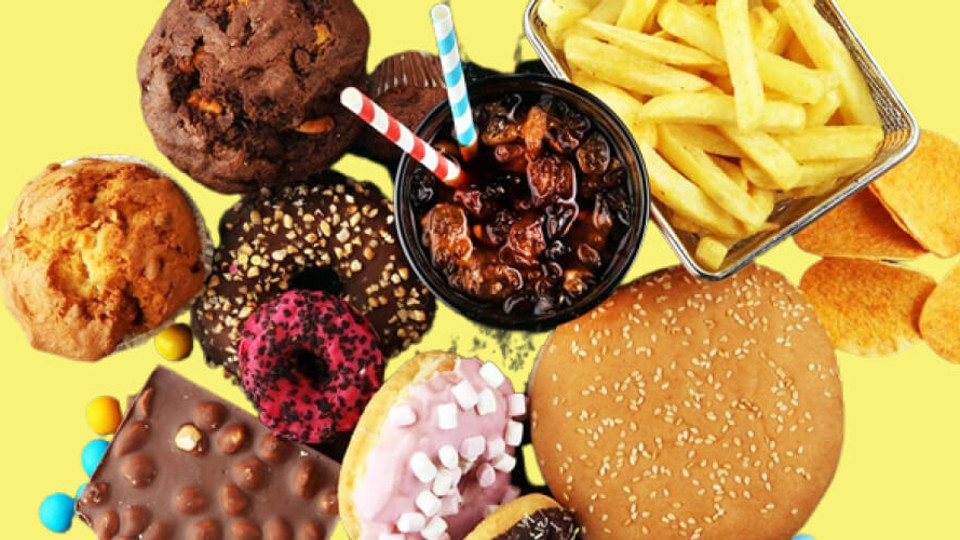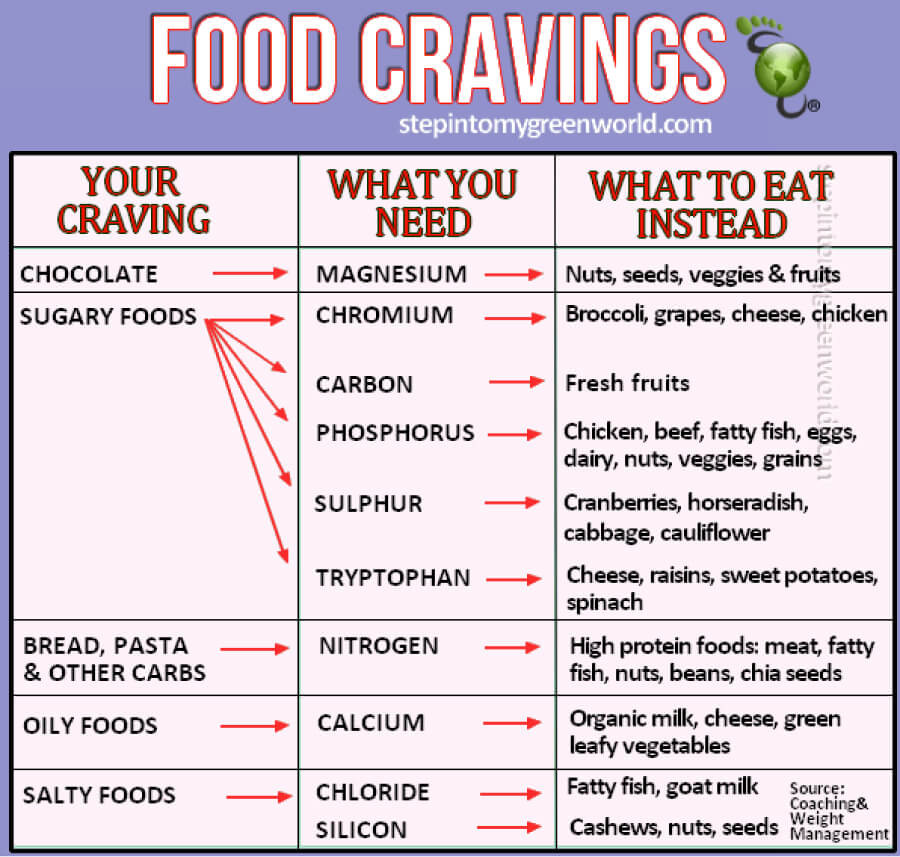
Do you ever find yourself reaching for the same snack or craving a certain food? You might have come across food craving charts that claim your cravings indicate you have some kind of nutritional deficiency.
But are these claims actually true? In this article, we’ll take a closer look at the science behind food cravings and debunk the myths surrounding food craving charts. So grab a snack and get ready to learn the truth about what drives our cravings and how you can begin to make healthier food choices.
What Are Food Craving Charts?
Have you ever heard of the theory that if you’re craving a certain (unhealthy) food, it means your body is deficient in something? There are plenty of “food craving charts” online that will tell you that when you’re craving a certain type of food, your body is trying to tell you it needs a certain vitamin and mineral and you should instead reach for something “healthier” with that vitamin or mineral.
For example, most food craving charts will tell you that if you’re craving chocolate, that means you’re deficient in magnesium, and should instead eat nuts, seeds, veggies and fruits. While these charts are intended to help people make informed food choices by pointing out what their bodies may be lacking, are they actually legit?

Do Cravings Indicate Nutritional Deficiencies?
Here’s the headline: studies show just because you’re craving something sweet, or salty or oily, it doesn’t mean you’re deficient in some kind of nutrient. Even when people are given a nutritionally balanced liquid diet, they still experience food cravings. For example, when participants in a study were given a nutritionally balanced, yet monotonous, liquid diet, they actually reported more food cravings than during a baseline period.
So, why do we experience food cravings? It’s actually more psychological than anything else. Food cravings are caused by a variety of neurotransmitters and hormones related to stress, hunger, and anxiety. These cravings are primarily focused on the pleasure and reward centers of the brain.
Another explanation is based on conditioning, where a cue that’s been paired with food intake can make someone crave that food. In real life, cues can be things like hunger or the time of day. Basically, there’s actually not enough evidence to show that a nutrient deficiency will cause food cravings, with studies actually showing it’s actually the psychological factors at play.
Factors that Influence Food Cravings
OK, so what actually causes food cravings then? Food cravings can be caused by a variety of factors, which we’ll jump into right now.
1. Poor Sleep
Sleep is as essential as diet and physical activity, allowing your body and brain to recharge. Inadequate sleep can disrupt hormone balance, leading to increased appetite and intensified food cravings.
2. Dehydration
Feeling thirsty can be mistaken for feeling hungry, and not getting enough water can make you crave more food. Studies show that drinking water before chowing down can help you eat less. So, next time you’re feeling hungry, try drinking water first and see if it helps curb those cravings.
3. Gut Microbiota
Did you know that your gut bacteria might be behind your food cravings? Recent studies suggest that the types of bacteria in your gut can affect the type and frequency of cravings you have. Basically, the food cravings you have may be due to an overabundance of microbes that benefit from the foods you’re craving.
4. Physical Inactivity
Wanna beat those pesky food cravings? Try getting off your butt and moving around a bit! Even just a short walk or jog can help reduce cravings. But, if you’re lazing around more than usual, you might find yourself wanting to munch on more snacks.
5. Ghrelin And Leptin Dysregulation
You might have heard of Ghrelin, also known as the “hunger hormone.” It’s responsible for making you eat more, storing fat, and keeping you hungry. Then there’s Leptin, which tells your brain when you’ve stored enough fat and it’s time to stop eating. If these two hormones get out of balance, you might end up with more cravings and hunger pangs.
6. Premenstrual Syndrome
For females, PMS can often be behind an increase in cravings. Changes in the hormones progesterone and oestrogen that occur during your period can heighten certain types of food cravings, particularly carbohydrate-rich foods.
7. Low Blood Sugar Levels
And then we get to low blood sugar levels, perhaps the biggest culprit behind food cravings. Skipping meals or going too long without eating can cause your blood sugar to drop. When this happens, your body craves foods that will quickly raise your blood sugar. Also, if you have an imbalance in blood sugar levels, you may experience more intense cravings. This is because insulin, which helps regulate blood sugar, can cause it to drop too low, leading to cravings for high-carbohydrate snacks.
Debunking Common Food Craving Myths

There are plenty of myths surrounding food cravings that can lead us to believe that our bodies are telling us something they’re not. One of the most common is that craving chocolate means you’re deficient in magnesium. While chocolate does contain magnesium, the amount is not significant enough to alleviate a deficiency. In fact, most chocolate bars contain added sugar, which can actually worsen magnesium deficiency. Instead, a craving for chocolate may simply be because it tastes yummy and gives us a rush of endorphins.
Other common myths include the idea that craving salty foods means you’re dehydrated or that craving red meat means you need more iron. However, scientific evidence suggests that these cravings are rarely indicators of a nutritional deficiency, but instead a result of other factors such as your emotional state or a habit of eating these types of foods.
How to Fight Cravings and Stick to Your Goals
The best way to fight food cravings? Get yourself on a well-rounded eating plan and focus on cultivating long-term healthy eating habits. Start small by switching to skimmed milk, opting for a long black instead of a Cappuccino, and choosing dark chocolate instead of milk chocolate. You can also start by swapping white pasta and rice for brown grains and try sweet potatoes instead of white potatoes.
Also, steer clear of any weight loss programs that say you should eliminate the entire food group (like carbs, for example), as crash diets only exacerbate cravings. Instead, aim for a diet that includes nutrient-rich foods like lean meat, poultry, fatty fish, and vegetables.
And, don’t forget to give yourself a little wiggle room for indulgences, but be mindful not to overdo it.
We all crave certain foods from time to time, and what we’re craving can be influenced by a variety of factors, including hormones, gut flora, hydration, and blood sugar levels. While food craving charts and popular myths may offer quick solutions, it’s important to approach cravings with a balanced and sustainable approach to eating. By making gradual changes to your eating habits and incorporating nutrient-dense foods, you can reduce the intensity and frequency of unhealthy cravings. Remember to listen to your body and enjoy treats in moderation, without guilt or restriction!




Absolutely agree! Cravings are not linked to nutritional deficiencies. While it’s probably not the answer you want to hear, the best way to reduce your cravings and regain control is to improve your relationship with food & your body!